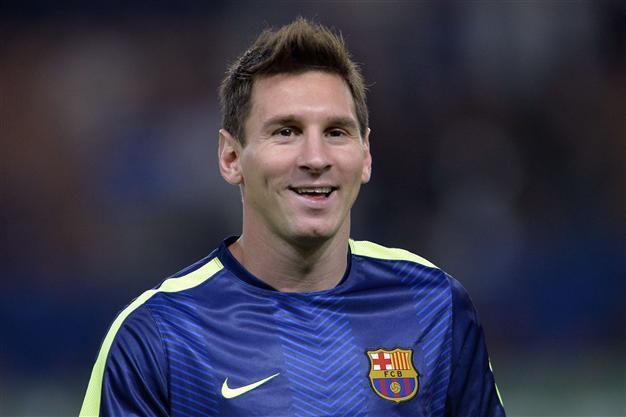Record-breaker Messi defines Barca's golden era
BARCELONA - Reuters

AFP Photo
Lionel Messi may lack a World Cup for Argentina but his 10 years with Barcelona have seen him rewrite the history books and become symbolic with the club's golden era.
Long before Messi made his debut for the Catalan club, coming on as a late substitute in the local derby with Espanyol on Oct. 16, 2004, aged 17, news had spread that Barca had a player in their renowned La Masia youth academy that was out of the ordinary.
Sports newspapers in Spain had reported that there was an Argentine youngster who could be the new Maradona and take the world by storm but few would have imagined what an impact he was going to make in the game and for Barcelona in particular.
The fact he arrived in Barcelona at all is thanks to the perseverance of his father Jorge, who having exhausted the options of clubs in Argentina, that would not pay or could not afford the growth hormone treatment the diminutive Lionel needed, looked overseas to Spain.
Barcelona's then technical director Carles Rexach needed little time to be convinced by the 13-year-old's potential and famously scribbled a quick contract on a serviette at the Pompeia tennis club with the player's agents.
From there Messi, now 27, quickly passed through the youth ranks before he made his first-team debut. His first goal came
with a delicate chip in his sixth appearance in the final game of the season against Albacete.
He went on to be named player of the tournament as Argentina won the 2005 Uunder-20 World Championship and ahead of the new season in a friendly against Juventus at the Nou Camp, the Italian coach Fabio Capello remarked: "Bring me this little devil, I've never seen a kid of his age be so tricky, he looks like Maradona."
Team leader Initially he was in the shadow of Ronaldinho but he quickly established himself as a leader of the team as the Brazilian's career at Barca ended prematurely due to a lack of discipline and his enjoyment of the city's night life.
Messi's most memorable goal is that against Getafe in 2007, which again sparked comparisons with Maradona as it was very similar to the latter's mazy dribble against England in the World Cup in 1986.
Starting on the right of midfield he left a succession of Getafe players in his wake before rounding the keeper and scoring.
It was following the arrival of Pep Guardiola as coach in 2008 that Messi really came to the fore as the talisman for the most successful period in Barca's history.
With Guardiola introducing the discipline that had been lacking under the laid-back Frank Rijkaard, Barca went on to win three successive league titles as well as the Champions League in 2009 and 2011 -- as well as plenty of other silverware.
"Messi is a competitive being, one day I will be able to look back and say that I trained Leo. He will break all the records," said Guardiola when he was Barca coach.
Scorring records On a personal level Messi has been voted World Player of the Year on four occasions and has a breathtaking scoring record. It includes hitting 73 goals in the 2011-12 season, over 400 goals for club and country in all competitions, and he is now closing in on the all-time Spanish scoring record.
Last season under coach Tata Martino all the major trophies escaped Barca and Messi was not at his best and a disappointing domestic season was followed by even greater disappointment at the World Cup.
Seeking to emulate Maradona's 1986 World Cup success, Argentina fell at the final hurdle to Germany but he has started this season with renewed vigour and he has a new target in his sights as he aims to beat Telmo Zarra's La Liga scoring record of 251 goals established during his 15 years at Atletico Madrid in the 1940s and 1950s.
Messi has scored 249 league goals and could break the record on Saturday when Barca play Eibar.
If he doesn't do it then, it won't be long before he does it somewhere else because the incredible career of one of football's all-time greats is far from over.
